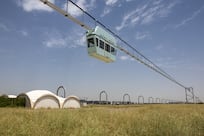A group of young boys walked on to the middle of their school's stage. One of the boys, 8, had a large fake beard and was hunched over the ground, playing the part of an old man tending to his garden.
His friend, playing a much younger man, asked what he was doing. The older man told him to "come and help me with these insects".
The young man did as he was asked, calling on his friends to come and help remove the insects from the palm trees.
The old man thanked them, saying: "It's when all of you are like one hand that strength happens."
The story was part of a play performed by grade 3 pupils at Mubarak bin Mohammed School in Al Bateen, Abu Dhabi, to celebrate National Day.
After the scene with the bearded elder, a screen dropped down to show a recorded clip of Sheikh Mohammed bin Zayed, Crown Prince of Abu Dhabi and Deputy Supreme Commander of the Armed Forces.
He reminded the children that while they were living in difficult times, they were well and prosperous.
"Today we are well because of one who has left us, our great father," Sheikh Mohammed said, referring to Sheikh Zayed, the founding President.
Speaking about President Sheikh Khalifa, he said: "We are all well because of Khalifa. We are all well because of our backbone, our allegiance and our pride – the children of this land and our brothers.
"Do not worry at what you see happening around you, as long as the home is united."
The children's parents – including fathers still dressed for work – packed into the school's theatre to watch their celebration of 42 years of the union.
The day's events started with the playing of the national anthem, followed by a reading from the Quran.
One member of the audience attended with her younger daughter, and explained the insect reference.
"You see those insects, they go deep inside the roots slowly and weaken the tree and the palm, which would lead it to fall. But now it will not fall," she said.
National Day celebrations bring generations together, and this school show was no different, with children wearing the traditional clothes of their mothers and grandmothers.
Mohammed Al Muhairi, from Al Bateen, said festivities celebrating the union had begun at the start of November when traditional mass weddings were organised.
In November, his son was one of 11 grooms married at the new majlis in Al Bateen, and attended by many Sheikhs.
"The whole month of November and December are happy times for all, and there are always weddings to make National Day even happier."
At Mubarak bin Mohammed's school, mothers played a big role in the celebrations and arrangements.
"If mothers always played a part in what is important to their children, we as country would reach the highest levels of living," one mother said.
"It sometimes hurts when we find that the younger generation's knowledge of older traditions is not as what we would wish for as mothers."
A committee of about 27 mothers had been arranging the celebrations for a month, planning a party atmosphere but also trying to incorporate educational aspects.
"The school agreed to give us a room in the campus and we have arranged it as a traditional and an educational room for all," said Mariam Al Mansoori, a mother on the committee.
"We displayed all kinds of the Arabic herbs and traditional healing methods along with the food we cook at home to give some of the essence of what we have in our houses."
The head of the committee, Nuha Al Mazroui, said most of the teachers and the principal had dressed in traditional clothing, down to the last detail.
"We created a competition for the local teachers to dress up the foreign teachers in national dress, " she said.
All of them had to observe every detail, from the shayla to serwal trousers and a burqa. Merta'asha (gold necklaces) were worn with shegab (earrings), and fatkh (gold worn on the toes).
Ebtisam Al Shehhi, the school's administrator, said the children had also been asked to perform at number of government buildings, including the airport, to share their traditions with visitors to the country.
"And that made us, teachers and the children, very proud,"she said.
balhashemi@thenational.ae
Abu Dhabi pupils learn about the UAE’s history for National Day
National Day celebrations bring generations together, and a show at Mubarak bin Mohammed School in Abu Dhabi was no different, with children wearing the traditional clothes of their grandmothers.

Editor's picks
More from the national





